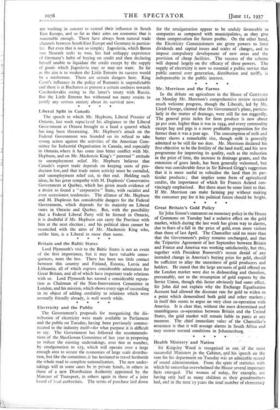Electricity and the Public The Government's proposals for reorganising the
dis- tribution of electricity were made available to parliament and the public on Tuesday, having been previously commu- nicated to the industry itself—for what purpose it is difficult to say. The Government has followed the recommenda- tions of the MacGowan Committee of last year in proposing to reduce the existing Undertakings, over 6óo in number, by amalgamation to 123, which will operate over a large enough area to secure the economies of large scale distribu- tion, but like the committee, it has hesitated to travel forthwith the whole road to complete nationalisation. The new under- takings will in some cases be in private hands, in others in those of a new Distribution Authority appointed by the Minister of Transport, in others again in those of a joint beard of !ccal authorities. The terms of purchase laid down for the amalgamation appear to be unduly favourable to companies as compared with municipalities,- as they give them compensation for future profits. On the other hand, the Electricity Commissioners are given powers to limit dividends and capital. issues and scales of charges, and to impose compulsory development of new areas and the proVision of cheap facilities. The success of the scheme will depend largely on the efficacy of these powers. The supply of electricity is now so essential a public service that public control over generation, distribution and tariffs, is indispensable in the public interest.
* * * *
























































 Previous page
Previous page